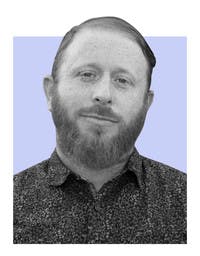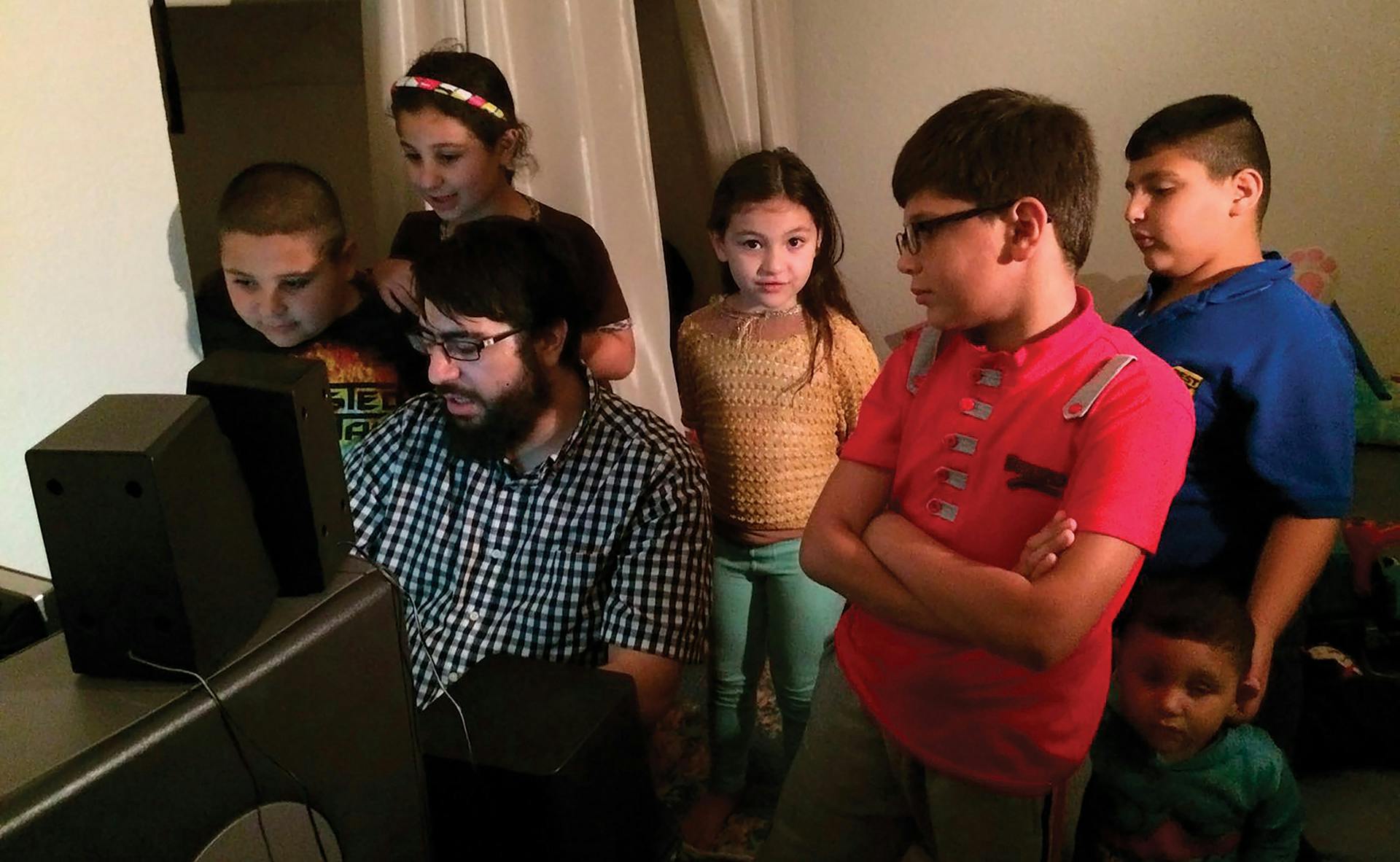Having crossed seas, deserts, and conflict zones, refugees arriving in the United States and other developed nations face a host of new challenges -- one of which is the digital divide. For those struggling with a new language and culture, the challenge of also learning to use computers, often for the first time, can be as daunting as it is vital to their future success.
Self-described computer geek Riad Sbai — whose parents immigrated from Syria to the U.S. in the late 1980s — founded the nonprofit PCs for Refugees (PCs) in 2016 to help recently relocated families obtain computers and the skills to use them. Though it started with Sbai donating a few personal computers, it has grown, now having helped over 500 families get computers and technical training and given out over two dozen laptops to college students. But this only captures a small part of the impact PCs and its partner organizations, such as The Welcome to America Project (WTAP) deliver. In addition to necessities and tools, this growing ecosystem of nonprofits, driven by volunteers who share Sbai’s basic altruistic impulse, provide refugees a warm welcome that offsets the anti-immigrant sentiments many of the newly arrived fear almost as much as the violence and hardships they fled.
However, it all began with depression, frustration, and a foreign hacker collective. Though Sbai was born in the U.S., he grew up visiting his extended family in Syria almost every summer, sometimes for three months at a time. He watched with growing alarm as a series of protests escalated into a civil war in 2011, fearing for his family and friends but unsure how to help from 7,000 miles away. He attended a few protests and flash mobs, but didn’t feel he was making a difference.
Then he started the first in a series of three websites. Though none are still online, they served to aggregate news about the Syrian conflict and document the ongoing humanitarian crisis. The third and final site , called Occupy Kafranbel, archived pictures of the witty and direct banners created by activists from there and displayed for several years at weekly protests in that Syrian city. Reported by news outlets across the globe, Sbai says it became the semi-official website for the group. He even met one of the principal organizers, Raed Fares, when the latter visited the U.S. to raise support for the faltering cause. However, the website was taken down by repeated attacks from (in Sbai's belief) the Syrian Electronic Army, a group of hackers who supported and were possibly funded by the Baathist government of current Syrian President Bashar Al-assad. Sadly, Fares was gunned down by an assassin on November 23, 2018.
Though attracting international attention through his websites, Sbai still felt like he wasn’t having the kind of impact he wanted. In the summer of 2015, he heard from a friend that a number of Syrian families displaced by the conflict had recently arrived in Phoenix, where Sbai then lived. Sbai and his mother quickly set up visits to welcome and greet four of these families.
“That's when we noticed that they had zero English skills,” Sbai explains. “A lot of them were highly motivated and highly skilled, but they didn't have the resources or technology available to them to take advantage of their skills and motivation.”
Not yet envisioning a nonprofit, Sbai resolved to donate a few personal computers and teach the families to use them. He loaded the computers with language-learning software such as Rosetta Stone. Sbai quickly noticed the impact the machines were having, particularly on the children’s academic performance. Wanting to help more, he made a post to his personal Facebook page requesting donations.
“A lot of these families didn’t realize how helpful it was for me too,” Sbai recalls. “It was very difficult at first, especially losing family members, but now knowing that you could finally help, it was literally like therapy.”
Working initially through personal references to find refugees and using social media and word-of-mouth to solicit donations, Sbai met more like-minded individuals and organizations. What had been a personal mission became a registered nonprofit backed by a team of motivated volunteers. Arizona State University provided crucial early support, granting the fledgling nonprofit roughly $17,000 dollars and indirectly helping to find their initial office in Phoenix. Sbai also began working with a number of religious groups, including churches, mosques, and synagogues, where he established bins to collect donated materials. These groups proved critical, providing PCs with the majority of its donations and often assisting the group further with marketing and in other ways.
PCs also began working with and eventually moved in to a building run by WTAP, a more established nonprofit with a large space in Tempe, Arizona. Started to honor the memory of a victim of the 9/11 attacks, the organization sends groups of volunteers to greet newly arrived families and deliver a range of items meant to help refugees become successful and self-sufficient -- everything from basic furniture items like couches and kitchen tables to cooking equipment to bicycles, through their partnership with another local nonprofit called Phantom Cyclist.
“Refugees, within six months, are expected to be paying for their own accommodations, paying for their own food, and they're also paying off a $1,500 debt for the ticket that got them here to an international organization,” explains Mike Sullivan, agency director for WTAP. “These are all things that are, ‘in order to.’ So bikes, in order to be able to ride to school, in order to be able to go to a job without having to rely on public transportation. If we learned somebody was a handyman, well, if you give him a set of tools, now he's a current handyman. Somebody was a seamstress, so we'll look for a sewing machine. We’re teaching people to do bike repair. Somebody else may have cut hair, so we'll try to find shears and tools that a barber might use.”
When PCs and WTAP learned they were serving the same families, a partnership quickly emerged. “They're really skilled at loading up the computers, and teaching refugees to use them, and getting translators to help them out,” Sullivan says of PCs. “The challenge was the infrastructure part of it: having a warehouse to store them, a place to drop things off, a place they could do all the work. We moved them in here because they were helping the same families that we were. Kiddingly, we say we live together but we're not married.”
This and other strategic partnerships help the small group of volunteers of PCs maximize their impact by focusing on what they do best: building computers and teaching people how to use them. For instance, the first step for any donated equipment, after an initial sorting phase, is to remove and clear the data from hard drives using the program DBAN, explains Yaseen Jamaludeen, PCs's IT manager, who is from India and works as a software business intelligence architect. Using a custom-built PC, they can clear as many as 12 hard drives at once, saving time -- especially since they often wipe each drive between three and seven times. If they receive a particularly large load of donations at once, such as when they received two pallets of netbook-style laptops from Intel, they may partner with Arizona Students Recycling Used Technology -- another nonprofit which also helps them fill donation gaps, providing monitors, keyboards or other components that tend to be donated less frequently.
After the data is cleared, volunteers load an operating system, typically Windows 10, and a number of programs tailored to a specific family. These include basic programs such as LibreOffice, 7-Zip, Acrobat Reader, Skype, WhatsApp, and Google Chrome. The web browser gets preloaded with a host of useful bookmarks, such as the closest library’s website, bus routes, free online educational programs on YouTube and other platforms such as Khan Academy, and many more. They also help families register with Connect2Compete, which provides high-speed internet for just $10 a month to families eligible for the National School Lunch Program. They strike a balance when configuring the machines, installing certain programs locally to ensure the families can use the computers even without internet access, while not overloading them and slowing performance.
Once the machines are prepped, they are paired with mice, keyboards, monitors, speakers, and sometimes printers into bundles to await delivery, which includes at least an hour of training. This step is crucial, since the digital divide is not just a lack of computers, but also the gaps in digital literacy. As a current volunteer and past recipient of several computers from PCs, 17-year-old Abdul Mohamed is a good example. Originally from Burma and a member of the persecuted Rohingya ethnic minority, his family fled the genocide there in a harrowing multi-country voyage by boat, foot, and finally plane, ending up in the U.S.
“I had never used computers when I came here as a refugee in 2016, and when I got to school, I couldn't even turn on the computer,” Mohamed says. He now dreams of one day becoming a software engineer and is capable of not just operating computers, but building and maintaining them as well. This is common for PCs and WTAP, who both often see clients return as volunteers and donors.
Now partnered with WTAP and other organizations throughout the area, PCs has seen a rapid growth in the number of computers distributed and a reduction in the time it takes to fill requests. Jamaludeen says that since November of 2018, PCs had delivered close to 150 bundles, with 30 more currently waiting to be delivered. By comparison, he says they only delivered roughly 250 in the previous 12-month period. PCs's satellite chapters in Philadelphia and Tucson ceased operations after their main volunteers both had to discontinue their work due to going back to school, but the Phoenix chapter has proved more enduring. Although Sbai recently moved to Clovis, California, to work as a data analyst for a hospital there, volunteers such as Jamaludeen, Mohamed, and others are continuing the work in Arizona, with Sbai hoping to begin a new chapter in California in the near future.
PCs’s story offers a number of practical lessons for those interested in helping refugees in other regions. Jamaludeen and Sbai both point to programs such as Microsoft’s Techsoup, which offers discounted software licenses and credits for cloud storage on Azure, or Google Ad Grants, which offers a $10,000 credit per month for Google Ads. Jamaludeen suggests focusing on building a strong process and using data visualization tools such as PowerBi, which track and record an organization's operations and offer discounted subscriptions to nonprofits. Sbai also points to religious institutions of nearly all faiths as often excellent sources for support and for finding contacts with local refugees, as many already actively work in such communities. Addtionally, Sbai suggests reaching out to universities, including to student groups, noting the currently active ASU chapter of PCs has proved an increasingly important source of volunteers and donations.
If a place as inhospitable as Arizona — which only a few years ago passed the infamous anti-immigrant law Arizona SB 1070 — can support such a unique and invaluable ecosystem of nonprofits, then other communities can too. As the story of PCs demonstrates, ordinary people are capable of making a difference in the lives of those in need, whether its by starting or volunteering with a nonprofit or simply donating an old computer or couch. Jamaludeen notes that a lack of technical expertise should never dissuade potential volunteers. Organizations need help with a wide range of tasks, everything from cracking encrypted hard drives to simply answering phone calls and emails. Whatever motivates people to help — whether its anger, frustration or sadness — Sbai’s biggest piece of advice was to understand that there are those in the community, no matter where it is, that always want to help.












